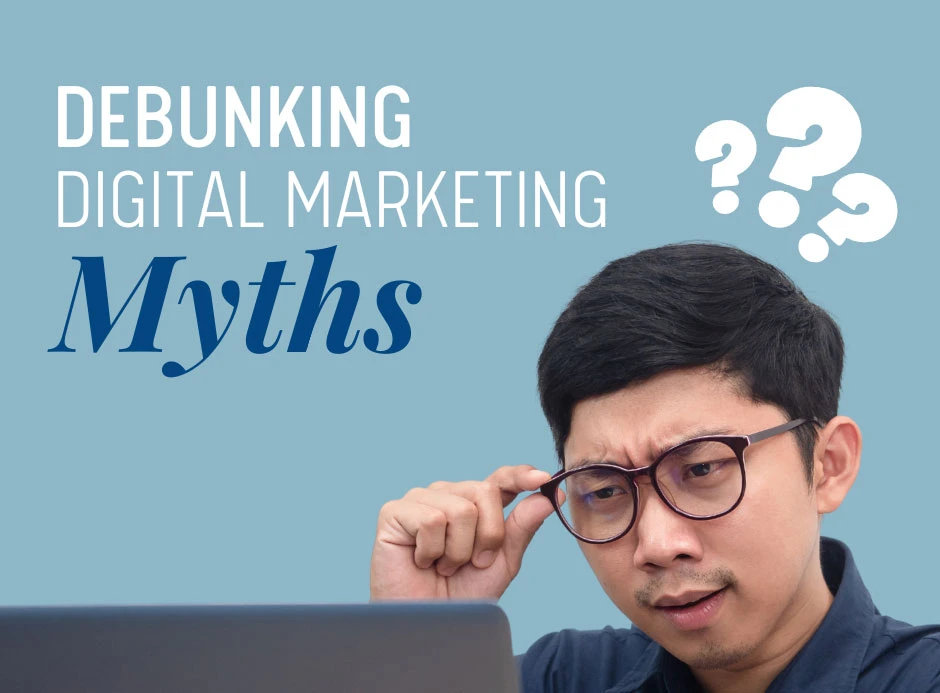Busting the Myths: Separating Digital Marketing Fact from Fiction

Digital marketing is a dynamic and ever-evolving field that has become indispensable for businesses looking to thrive in today’s digital-first world. However, with its rise in popularity comes a slew of misconceptions that can mislead even the savviest marketers. Let’s debunk some of the most common myths in digital marketing and uncover the truth behind them.
Myth 1: Digital Marketing is Only for Big Businesses
The Truth: Digital marketing is for everyone. Small and medium-sized businesses (SMBs) can leverage digital marketing to reach their target audience effectively without breaking the bank. Tools like social media platforms, email marketing, and local SEO allow smaller businesses to compete with larger corporations. In fact, digital marketing often levels the playing field by offering measurable, cost-effective strategies.
Myth 2: SEO is Dead
The Truth: Far from it! Search Engine Optimization (SEO) is alive and constantly evolving. While SEO tactics have changed over the years, the core principle, improving your website’s visibility on search engines remains crucial. Incorporating high-quality content, optimizing for mobile devices, and focusing on user experience are essential elements of modern SEO strategies.
Myth 3: Social Media Marketing is Free
The Truth: While organic social media efforts can be cost-effective, building a significant and engaged audience often requires paid advertising. Platforms like Facebook, Instagram, and Twitter rely on advertising revenue to sustain their businesses. Paid campaigns can significantly boost reach, target specific demographics, and drive conversions.
Myth 4: Email Marketing is Outdated
The Truth: Email marketing remains one of the most effective digital marketing strategies, boasting an impressive return on investment (ROI). Personalized, targeted email campaigns can help nurture leads, build relationships, and drive sales. Rather than being outdated, email marketing has adapted to include automation and personalization tools that make it more powerful than ever.
Myth 5: You Need to Be on Every Social Media Platform
The Truth: It’s better to excel on a few platforms than to spread yourself thin across all of them. Identify where your target audience spends the most time and focus your efforts there. For some businesses, LinkedIn might be the most effective platform, while others may thrive on Instagram or TikTok.
Myth 6: More Followers Equals More Sales
The Truth: The assumption that having a large number of followers directly correlates with increased sales is misleading. Engagement quality matters more than sheer numbers; businesses should prioritize building relationships with their audience rather than simply aiming for follower count.
Myth 7: Results Happen Overnight
The Truth: Many expect immediate results from their digital marketing efforts. In reality, successful digital marketing takes time and consistent effort to build brand awareness and achieve desired outcomes. Patience and persistence are key components of any effective strategy.
Myth 8: The More Content, the Better
The Truth: Quality always trumps quantity. Publishing a large volume of low-quality content can harm your brand’s reputation and SEO rankings. Instead, focus on creating well-researched, engaging, and valuable content that resonates with your audience. One high-quality blog post can outperform dozens of mediocre ones.
Myth 9: Digital Marketing is Expensive
The Truth: Many believe that effective digital marketing requires a large budget. However, there are numerous cost-effective strategies available, such as social media marketing and content creation, which can yield significant results without breaking the bank. Understanding how to leverage these tools effectively can lead to successful campaigns at lower costs.
Myth 10: Digital Marketing Can Work Without a Strategy
The Truth: A well-thought-out strategy is the backbone of any successful digital marketing effort. Randomly posting on social media or sending sporadic emails will not yield consistent results. A comprehensive plan ensures that all efforts align with your business goals and resonate with your target audience.
Understanding these myths in digital marketing can significantly enhance how businesses allocate resources and design their strategies. By debunking these misconceptions, marketers can approach their campaigns with a clearer perspective, ultimately leading to better engagement and growth in the digital landscape.
